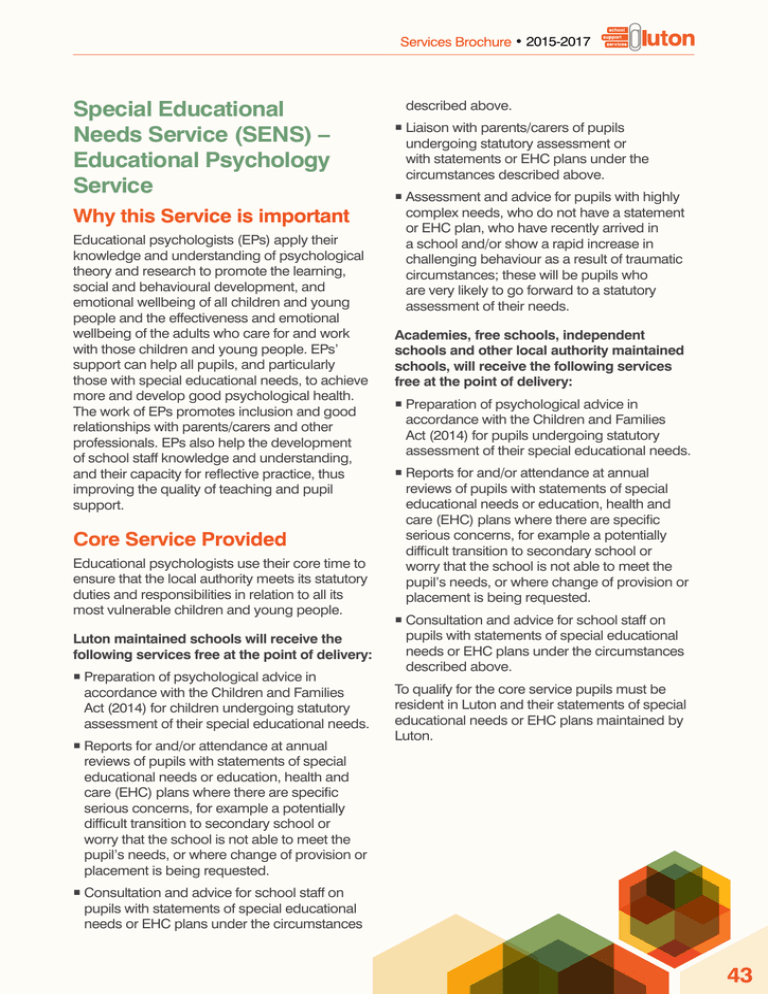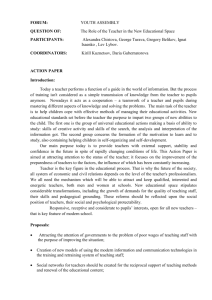43 Special Educational Needs Service (SENS) – Educational
advertisement

Services Brochure • 2015-2017 Special Educational Needs Service (SENS) – Educational Psychology Service Why this Service is important Educational psychologists (EPs) apply their knowledge and understanding of psychological theory and research to promote the learning, social and behavioural development, and emotional wellbeing of all children and young people and the effectiveness and emotional wellbeing of the adults who care for and work with those children and young people. EPs’ support can help all pupils, and particularly those with special educational needs, to achieve more and develop good psychological health. The work of EPs promotes inclusion and good relationships with parents/carers and other professionals. EPs also help the development of school staff knowledge and understanding, and their capacity for reflective practice, thus improving the quality of teaching and pupil support. Core Service Provided Educational psychologists use their core time to ensure that the local authority meets its statutory duties and responsibilities in relation to all its most vulnerable children and young people. Luton maintained schools will receive the following services free at the point of delivery: ¡¡Preparation of psychological advice in accordance with the Children and Families Act (2014) for children undergoing statutory assessment of their special educational needs. ¡¡Reports for and/or attendance at annual reviews of pupils with statements of special educational needs or education, health and care (EHC) plans where there are specific serious concerns, for example a potentially difficult transition to secondary school or worry that the school is not able to meet the pupil’s needs, or where change of provision or placement is being requested. described above. ¡¡Liaison with parents/carers of pupils undergoing statutory assessment or with statements or EHC plans under the circumstances described above. ¡¡Assessment and advice for pupils with highly complex needs, who do not have a statement or EHC plan, who have recently arrived in a school and/or show a rapid increase in challenging behaviour as a result of traumatic circumstances; these will be pupils who are very likely to go forward to a statutory assessment of their needs. Academies, free schools, independent schools and other local authority maintained schools, will receive the following services free at the point of delivery: ¡¡Preparation of psychological advice in accordance with the Children and Families Act (2014) for pupils undergoing statutory assessment of their special educational needs. ¡¡Reports for and/or attendance at annual reviews of pupils with statements of special educational needs or education, health and care (EHC) plans where there are specific serious concerns, for example a potentially difficult transition to secondary school or worry that the school is not able to meet the pupil’s needs, or where change of provision or placement is being requested. ¡¡Consultation and advice for school staff on pupils with statements of special educational needs or EHC plans under the circumstances described above. To qualify for the core service pupils must be resident in Luton and their statements of special educational needs or EHC plans maintained by Luton. ¡¡Consultation and advice for school staff on pupils with statements of special educational needs or EHC plans under the circumstances 43 Services Brochure • 2015-2017 Details of Service All schools may purchase as much additional time as they wish. How this time is used is negotiated with the school’s educational psychologist (EP) and will reflect the individual needs of pupils and schools. Schools are charged for the time EPs spend doing on-site visits. The cost generally includes all preparation for visits, written feedback, telephone calls and other administration tasks. However if a school requests work where associated off-site tasks will take longer than usual, for example, a lengthy written feedback or regular telephone consultations, this may incur additional cost. This will be negotiated with the EP. Services provided by the Educational Psychology Service include: ¡¡Work with individual pupils with complex needs and their parents/carers, including consultation, assessment, advice and intervention (e.g. Cognitive Behaviour Therapy (CBT), play therapy, work with parents). ¡¡Work with groups of pupils (e.g. social skills, anxiety, stress and anger management). ¡¡Work with staff groups (e.g. staff surgeries, support for SENCos, NQTs, TAs, staff supervision groups). ¡¡Training: EPs will develop training to meet schools’ individual needs. Recently delivered training sessions include topics such as motivation, attachment and resilience, bereavement and loss, cognitive development, behaviour management, managing stress, self-esteem, working with parents, bullying, learning to read, advice on specific syndromes. ¡¡Work at the whole school level. EPs have considerable training in research and evaluation and can support schools with change management, needs analysis and evaluation of interventions and provision and with developing and managing specific projects. ¡¡School Liaison Meetings (SLMs) held with other support services to act as a forum for consultation and discussion and to plan work to be done in the school. 44 Obligations on the part of the School/Academy or Educational Establishment To provide a member of staff, usually the SENCo, to act as a key contact to support the efficient delivery of services by the Educational Psychology Service. Quality Assurance Standards ¡¡All team members are registered as educational psychologists by the Health and Care Professions Council (HCPC). ¡¡Performance of all EPs is monitored by regular supervision with a team manager, following guidance by the HCPC and British Psychological Society (BPS), and through the Local Authority’s Personal Performance Assessment Process. ¡¡Sampling of parent/carer views and those of children and young people. ¡¡On-going and annual discussion with schools evaluating work; feedback to schools. ¡¡Phone calls, e-mails and letters answered promptly, within Council guidelines. ¡¡Monitoring of SLAs to ensure visits agreed are delivered. ¡¡Schools to be informed of an EP’s absence as soon as possible. ¡¡EPs will normally expect to complete written feedback within four weeks. However in complex cases this may take longer. The expected timeframe will be negotiated with the school contact. Service Contact Name: Harriet Martin Telephone: 01582 548153 Email: harriet.martin@luton.gov.uk





